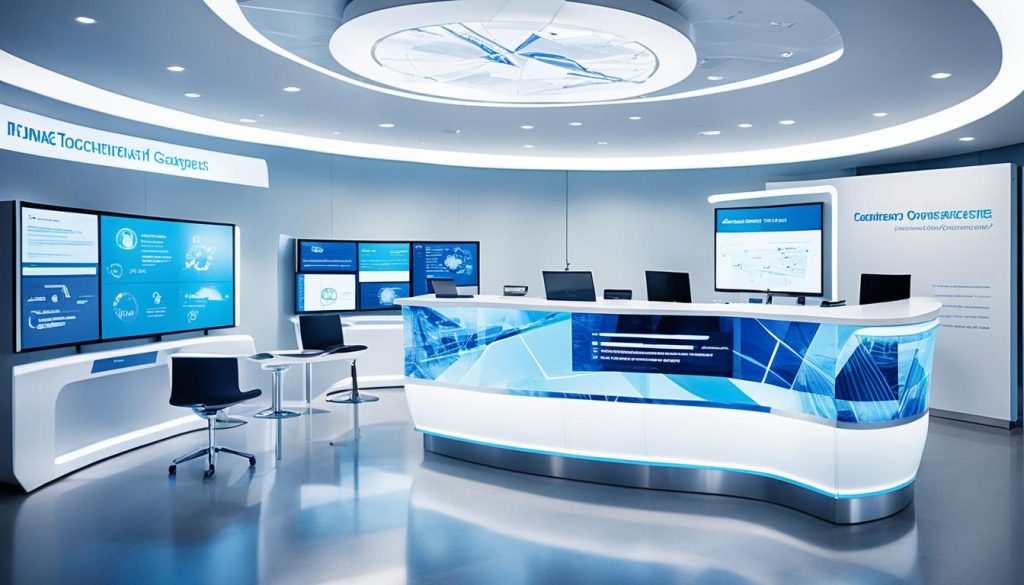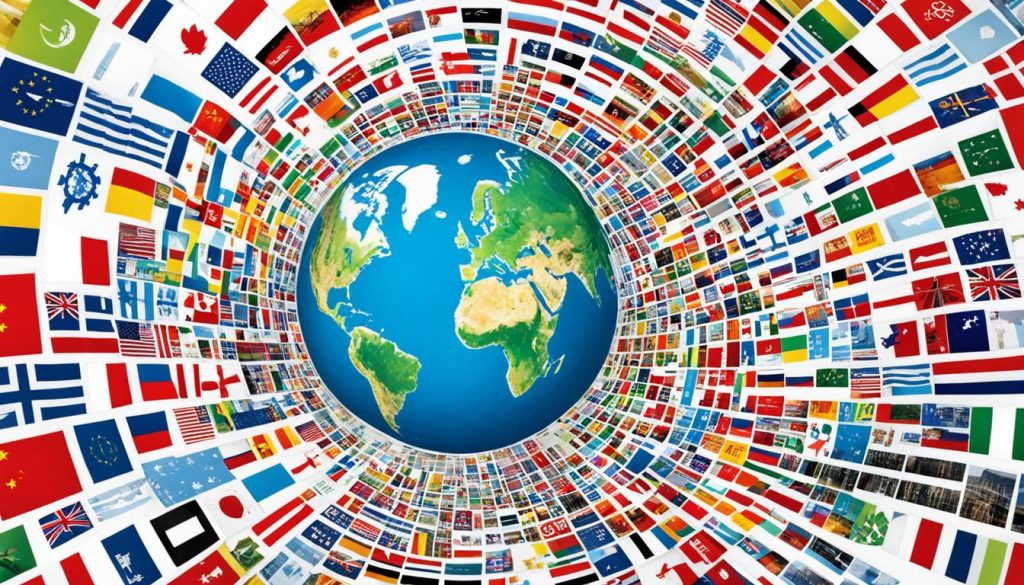Multinational corporations, known as MNCs, play a big role in the world economy. They have facilities and do business in many countries. This makes them very different from companies that only work in one country. MNCs help with global trade and bringing countries closer economically.
MNCs stand out because they can handle different markets and adapt to various cultures and rules. They make sure their brand is the same everywhere. They set up branches and subsidiaries in other countries. This helps them serve customers locally. MNCs are also at the forefront of new research and technology. This keeps them ahead in a fast-changing market.
Key Takeaways
- Multinational corporations operate in multiple countries, driving cross-border operations and global trade.
- These business entities possess extensive facilities and assets internationally, distinguishing them from domestic companies.
- The presence of international branches aids in localised service delivery and }])
- MNCs leverage advanced technology and innovation to maintain a competitive edge.
- Understanding and adapting to diverse cultural and regulatory environments is vital for multinational corporations.
Global Presence and Operations
Multinational corporations (MNCs) have a big impact globally, thanks to their many international branches. These branches help them get into different markets easily. This also makes them more well-known and competitive.
Significance of International Branches
International branches are key for MNCs to work well worldwide. They let companies tailor their approaches for each area’s needs. This way, MNCs fit right into local markets, making them more adaptable and efficient.
- Market Penetration: International branches provide a strategic advantage in entering and expanding in new markets.
- Proximity to Customers: Being closer to local customers aids in understanding their needs and responding promptly.
- Operational Flexibility: Local offices enable operational adjustments to align with regional regulations and market conditions.
Role in Local Economies
International branches boost local economies big time. They create jobs, build infrastructure, and help local businesses grow. This can lead to more wealth and jobs in the region.
- Job Creation: Establishing branches leads to employment opportunities, benefiting local communities. “Job Creation” li>
- Infrastructure Development: MNCs invest in local infrastructure, often improving facilities and services.
- Stimulating Growth: The presence of international branches attracts other businesses and investments, spurring economic growth.
MNCs’ international branches also do a lot for social responsibility. They help make the places they are in better by promoting sustainable development.
Diverse Workforce
A multinational corporation thrives thanks to its culturally diverse team. It uses a strategy that values this diversity, boosting innovation. This approach brings in a wide range of ideas and experiences. It is key for managing a global team and helps achieve success worldwide.
Recruitment Practices
Building a diverse team starts with good recruitment. Companies use technology and global networks to find talent from various cultures. Their recruitment aims to be inclusive, welcoming people with different skills and views.
They often work with international universities and attend global job fairs. This helps them find a strong and varied workforce.
Cross-Cultural Management
To manage a diverse team well, companies need good cross-cultural practices. They provide training that builds cultural understanding. This helps employees work well together in a multicultural setting.
Knowing about cultural differences reduces misunderstandings. It makes the workplace more collaborative and welcoming. Cross-cultural management is crucial for maintaining team harmony.
Advanced Technology Utilisation

Today’s business world is changing fast. Big companies use top technology to stay ahead and work efficiently. They build strong tech foundations to improve how they work globally. This means better processes, safer data, and easier communication.
Technological Infrastructure
Big names like Microsoft, IBM, and Siemens spend a lot on tech. They have modern data centers, cloud computing, and strong cybersecurity. These investments help them work better and spark new ideas.
Innovation and Research & Development
R&D is vital for a company’s success. Companies like Google and Apple show how investing in R&D leads to new tech. They put money into R&D to keep innovating, leading the market, and making products that meet customer needs.
| Company | R&D Investment (in billions) | Key Innovations |
|---|---|---|
| US$27.6 | AI and Machine Learning | |
| Apple | US$18.8 | Advanced Hardware Design |
| Microsoft | US$20.7 | Cloud Computing |
Having an innovation culture keeps companies at the top. By investing in new tech, they improve and create things that lead the market.
Complex Organisational Structure
Multinational corporations (MNCs) have a complex structure that is key to their global success. They develop strong management systems for good decision-making. This structure helps them carry out strategies worldwide efficiently.
Inside MNCs, a clear hierarchy manages their vast operations across different countries. This system makes sure strategic decisions are passed from the top down effectively. It helps maintain steady performance and direction worldwide.
Effective coordination among subsidiaries is also crucial. It involves aligning the operations of branches worldwide with the company’s main goals. This unified approach boosts productivity and helps achieve global aims.
Global governance mechanisms are critical for overseeing international activities. These include policies and practices that ensure the company follows its global strategy and meets regulations. Such governance leads to stability, reduces risks, and encourages growth in various markets.
The table below showcases different organisational elements intrinsic to MNCs’ successes:
| Element | Role | Impact |
|---|---|---|
| Hierarchical Management | Structured decision-making | Streamlined operations |
| Subsidiary Coordination | Synchronisation of activities | Enhanced productivity |
| Global Governance | Oversight of international operations | Sustainable global growth |
In short, MNCs rely on detailed management, coordination, and governance. These elements are critical for their success worldwide.
Strong Financial Resources
Multinational corporations are very strong financially. This strength helps them do well even when the economy is unstable. They can generate lots of capital, which is key to their growth and global investment capacity.
They also have a high level of financial stability. By spreading their investments, they can handle economic problems in some areas without big losses. This way, they keep going strong even when small companies might struggle.
These companies have access to lots of resources, including money and global funding. With these, they can grow and innovate all over the world. Their strong financial base lets them make bold moves.
They also have a big global investment capacity. This allows them to start new projects and make strong partnerships. They’re not just leaders at home; they set the standard worldwide.
Public Image and Corporate Reputation

In modern markets, a positive public image and strong corporate reputation are key. This matters a lot for big companies across the world. Being loyal to social duties boosts their brand and gains people’s trust.
Corporate Social Responsibility
The push for a good public image starts with corporate social responsibility, or CSR. Big names like Unilever and Nestlé spend a lot on being sustainable and helping communities. This shows they are ethical, which makes people trust them more.
By doing so, they make their brand stronger and more respected in their field.
Brand Recognition
Making a brand known is part of improving a company’s reputation. Giants like Apple and Samsung use powerful marketing and quality products to grow their brand. They know having a trusted brand brings loyalty from customers.
Good brand strategies help a company stand strong in the marketplace. They also show commitment to being the best and reliable.
Market Diversification
Market diversification helps big companies spread their risks. By spreading across different areas, they depend less on one market. This cuts down risks from economic lows, political troubles, or uncertainties in regions.
Having a range of products is key to this strategy. Multinationals can meet different needs and follow local laws with varied products. This way, they make more money and adapt better to changing markets.
Companies like Unilever and Nestlé thrive globally by knowing what locals want. Their global presence lets them quickly adapt to new trends and consumer preferences.
Diversifying across industries also adds to a firm’s strength. By being active in different fields, a company can manage downturns in one area by doing well in others. This balance is crucial for growth and success worldwide.
Standardisation and Adaptation in Products
Multinational companies must strike a balance between a worldwide product strategy and local needs. This balance is key. It lets them keep a consistent brand but also consider what different regions want.
Product Range and Customisation
Choosing the right product range means looking at both global and local tastes. For global products to succeed, adapting them is often necessary. This helps keep the brand uniform but also adds special features that locals will love.
For example, McDonald’s changes its menu for different countries. It offers the McAloo Tikki in India and the Teriyaki Burger in Japan.
Standardisation vs. Local Adaptation
The choice between keeping things the same or adapting them is vital for global companies. Standardisation helps keep the brand and quality consistent. This can make things more efficient and cut costs.
However, adapting products for local markets means they fit better with what people want and their culture. This can make customers more satisfied and loyal. Companies need to balance these approaches to match their worldwide strategy.
| Aspect | Standardisation | Local Adaptation |
|---|---|---|
| Brand Consistency | High | Dependent on local customisation level |
| Cost-Effectiveness | More cost-effective | Higher costs due to customisation |
| Customer Satisfaction | Varies | Generally higher |
| Market Reach | Broader but less tailored | Localized and deeply entrenched |
What are the characteristics of a multinational
Multinational enterprises have special qualities that let them work globally. Knowing these traits is vital to understand their success worldwide.
One main trait is their complex worldwide operations. This complexity helps them handle activities across many countries, ensuring top performance everywhere. They deal with complicated supply chains, make strategic alliances, and use advanced communication to connect their offices around the world.
They also use various business models internationally. This might mean owning companies outright, forming partnerships, or making contracts to best fit each market. Their ability to pick the right approach shows their skill in dealing with different rules and cultural settings.
Let’s look at a table summarising some important features of these big companies:
| Characteristic | Description |
|---|---|
| Diverse Workforce | They focus on hiring a team from different cultures. This encourages new ideas and understanding between cultures. |
| Advanced Technology Utilisation | They invest in the best tech to support their work around the world and to keep innovating. |
| Strong Financial Resources | They have lots of money for investing in new places and maintaining their operations all over. |
| Market Diversification | They use strategies to spread their risks across different areas and sectors, keeping the company stable. |
Looking at these key traits of multinationals, we can see how their deep knowledge of global operations and smart use of international business models help them stay ahead worldwide.
Strategic Alliances and Partnerships
Many world-leading companies now see strategic alliances and partnerships as key. They join forces collaboratively to enter new markets. This way, they share resources well and grow.
Starting cross-border alliances brings a special bonus. It mixes local know-how with worldwide views. This helps products and services fit well with different people’s needs.
Creating synergy is vital when businesses work together. They merge their strengths to craft new solutions, make processes smoother, and cut costs. This not only makes them stronger against rivals but also brings great benefits to those involved.
Here’s a quick look at the good things that come from strategic alliances and partnerships:
| Benefit | Description |
|---|---|
| Market Expansion | Getting into new places and reaching more customers. |
| Resource Sharing | Using tech, money, and skills together. |
| Risk Mitigation | Spreading out the chances of things going wrong. |
| Innovation | Joining forces in R&D for new breakthroughs. |
Compliance with International Regulations
Today, world businesses must follow many laws and rules to operate globally. This means they must obey various legal systems to run smoothly everywhere. High standards in ethics make a company more trusted and respected.
Adherence to Legal Standards
Multinational companies face a big challenge: they must follow laws in many places. They have to keep up with changing laws all over the world. This way, they can work efficiently and safely.
Ethical Practices
Acting ethically is more than just obeying laws. It’s about being honest and responsible in everything a company does. Companies like Unilever and Nestlé show how doing the right thing helps them grow and succeed for a long time.
Economies of Scale

Multinational corporations use economies of scale to get ahead in the global market. They spread out their big operations in different places. This way, they use resources better and become much more efficient.
Cost Efficiency
Economies of scale mainly help save money. When companies make more products, the cost for each item goes down. They buy materials in bulk, make their shipping better, and use machines that are great for making lots of products.
Production Scalability
Multinational corporations are good at making their production meet global needs. They can change how much they make based on what the market wants. This keeps their supply chain stable and helps them keep their place in the market.
| Factor | Impact on Cost Efficiency | Impact on Scalable Production Processes |
|---|---|---|
| Bulk Purchasing | Reduces cost per unit | Enables higher production volumes |
| Advanced Machinery | Decreases labour costs | Increases throughput |
| Streamlined Logistics | Lowers transportation expenses | Ensures timely distribution |
Risk Management Strategies
In today’s global business scene, big companies need powerful risk management strategies to stay strong. Risk mitigation is crucial. It’s about spotting and evaluating threats. Then, these companies work out plans to handle these risks well.
Strategic planning is key in dealing with potential dangers. It’s not just about seeing possible risks ahead. It also means having backup plans ready. These plans help businesses overcome unexpected issues without hurting their operations. Staying ahead helps firms strengthen their global stance.
Corporate resilience is vital too. It’s all about a company’s ability to adjust to changes and bounce back from setbacks. A solid risk management system keeps businesses adaptable. This way, they can keep succeeding, no matter the economic, political, or environmental hurdles.
To show how important these strategies are, look at this table. It shows common risks and how to mitigate them:
| Type of Risk | Risk Mitigation Approach |
|---|---|
| Market Volatility | Diversification of investment portfolio and flexible pricing strategies |
| Regulatory Changes | Regular compliance audits and changing business practices to meet new rules |
| Supply Chain Disruptions | Creating a resilient supply chain with many suppliers and backup plans |
| Geopolitical Instability | Continuous monitoring and planning for different scenarios |
Supply Chain Management
Supply chain management is key for big companies to stay ahead. By efficiently managing their global supply chains, they cut costs. This smoothens their operations worldwide.
Global Sourcing
Global sourcing lets companies buy goods from all over. It provides quality goods and cuts down production costs. By having various suppliers, companies reduce risks and strengthen their supply chains.
Logistics and Distribution Networks
Building strong logistics and distribution networks is crucial. It ensures quick and reliable product delivery worldwide. By making logistics efficient, companies lower costs.
They improve distribution by picking the best routes and using high-tech to track stock. Working closely with freight partners and local distributors makes these networks better.
Managing international supply chains takes careful planning. Focusing on smart sourcing and improving distribution helps companies grow. This leads to success.
- Identify reliable suppliers from varied regions to ensure efficient sourcing.
- Implement advanced tracking systems to enhance distribution efficiency.
- Collaborate with logistics partners to streamline transportation routes.
| Key Aspect | Benefits |
|---|---|
| Global Sourcing | Access to diverse materials and cost reduction |
| Efficient Logistics | Minimised delays and reduced operational costs |
| Distribution Networks | Enhanced delivery reliability and market reach |
Investment in Human Capital
Investing in human capital is key for multinational corporations to thrive long-term. Focusing on workforce development helps them stay ahead in various markets. By putting money and effort into talent, businesses can build a dynamic and skilled team ready for global challenges.
Workforce development includes ongoing education, training, and mentorship. These steps boost skills, helping employees support the company’s aims. For example, Unilever and Siemens offer extensive training. This prepares employees for present and future tasks.
Beyond training, investing in talent means creating a supportive workspace. It encourages creativity and personal growth. Multinational firms run leadership and cross-cultural programmes to expand their team’s views and skills. Smart investments like these keep human capital flexible, knowledgeable, and ready to achieve global goals.
















